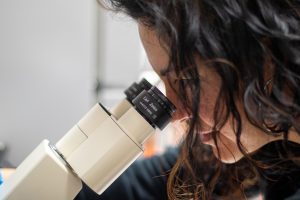JUANITA LIMAS is a Ph.D. candidate and both an HHMI Gilliam Fellow and a Burroughs Wellcome GDEP Fellow in the Cook Lab. Her research focuses on genes with the potential to cause cancer, specifically those that disrupt the cell cycle by affecting mechanisms of DNA replication.
A lot of my work depends on keeping up with the literature. In the biomedical field, you have to stay on top of who’s doing what. And there’s huge pressure as a graduate student to get published.
There is not a single day that I don’t think about publications or journals or scholarly research. It affects everything that I do. I can’t leave here unless I have the right number of publications and they’re in the right journals.

Some faculty still believe you need a Cell, Science or Nature paper. Others are supportive of open access. If you’re a graduate student, you have to learn how to play both games. You’re doing yourself a disservice if you’re not informed about these issues.
Science should be for everyone, but it’s not. The currency by which academia runs is publications. That currency is flawed. If you don’t go to the right school, or live in the right zip code, or have the right amount of money, you’re pretty much locked out.
I taught at a community college for seven years before I started my Ph.D. program in Pharmacology. My students would try to research certain subjects, but they couldn’t get access to the articles they needed because our community college library didn’t have the resources that Carolina has. Even now, I have friends at smaller institutions who tell me they don’t have access.
I served in the Peace Corps years ago and have friends who are medical professionals in Latin America. They can’t get access to many journals. This system excludes scientists on the worldwide stage because they often don’t have the funds to pay for access.
Academia has traditionally excluded people like me. I am a first-generation college student trying to navigate my way through this system. I’m trying to make it so that more people like me can participate.
I’m very fortunate to be at Carolina. I’ve had so much access and so many privileges here. But I often think about my former students at the community college who never had access to this information. It’s very inequitable. Open access can help to fix that. It’s an incredibly important issue.
News first featured in Voices section of the May 6, 2020 UNC Library website.
